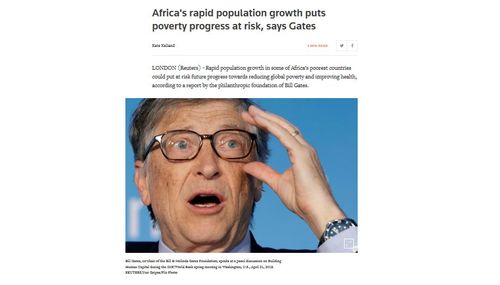


By Steve Sailer
09/18/2018
A few days ago I wrote:
Personally, I suspect that Bill and Melinda Gates know about and worry about African overpopulation more than I do, and they are playing a complex 4-D chess game to try to do something about it.
But I worry that nobody else will notice what they are worried about.
From Reuters today:
Africa’s rapid population growth puts poverty progress at risk, says Gates
Kate Kelland
LONDON (Reuters) — Rapid population growth in some of Africa’s poorest countries could put at risk future progress towards reducing global poverty and improving health, according to a report by the philanthropic foundation of Bill Gates.
Demographic trends show a billion people have lifted themselves out of poverty in the past 20 years, the report found. But swiftly expanding populations, particularly in parts of Africa, could halt the decline in the number of extremely poor people in the world, and it may even start to rise.
“Population growth in Africa is a challenge,” Gates told reporters in a telephone briefing about the report’s findings.
It found that poverty in Africa is increasingly concentrated in a few countries, which also have among the fastest-growing populations in the world. By 2050, it projected, more than 40 percent of world’s extremely poor people will live in just two countries: Democratic Republic of the Congo and Nigeria.
Asked about the best ways of tackling the growing population and poverty challenge, Gates said improving access to birth control was key, and this should be combined with investment in young people’s health and education.
“The biggest things are the modern tools of contraception,” Gates said. “If you have those things available then people have more control over being able to space their children.”
The report, entitled Goalkeepers, tracks 18 data points on United Nations development goals, including child and maternal deaths, stunting, access to contraceptives, HIV, malaria, extreme poverty, financial inclusion, and sanitation.
In its family planning section, the report called on policymakers to empower women to exercise the right to choose the number of children they have, when they have them, and with whom.
According to U.N. data, Africa is expected to account for more than half of the world’s population growth between 2015 and 2050. Its population is projected to double by 2050, and could double again by 2100.